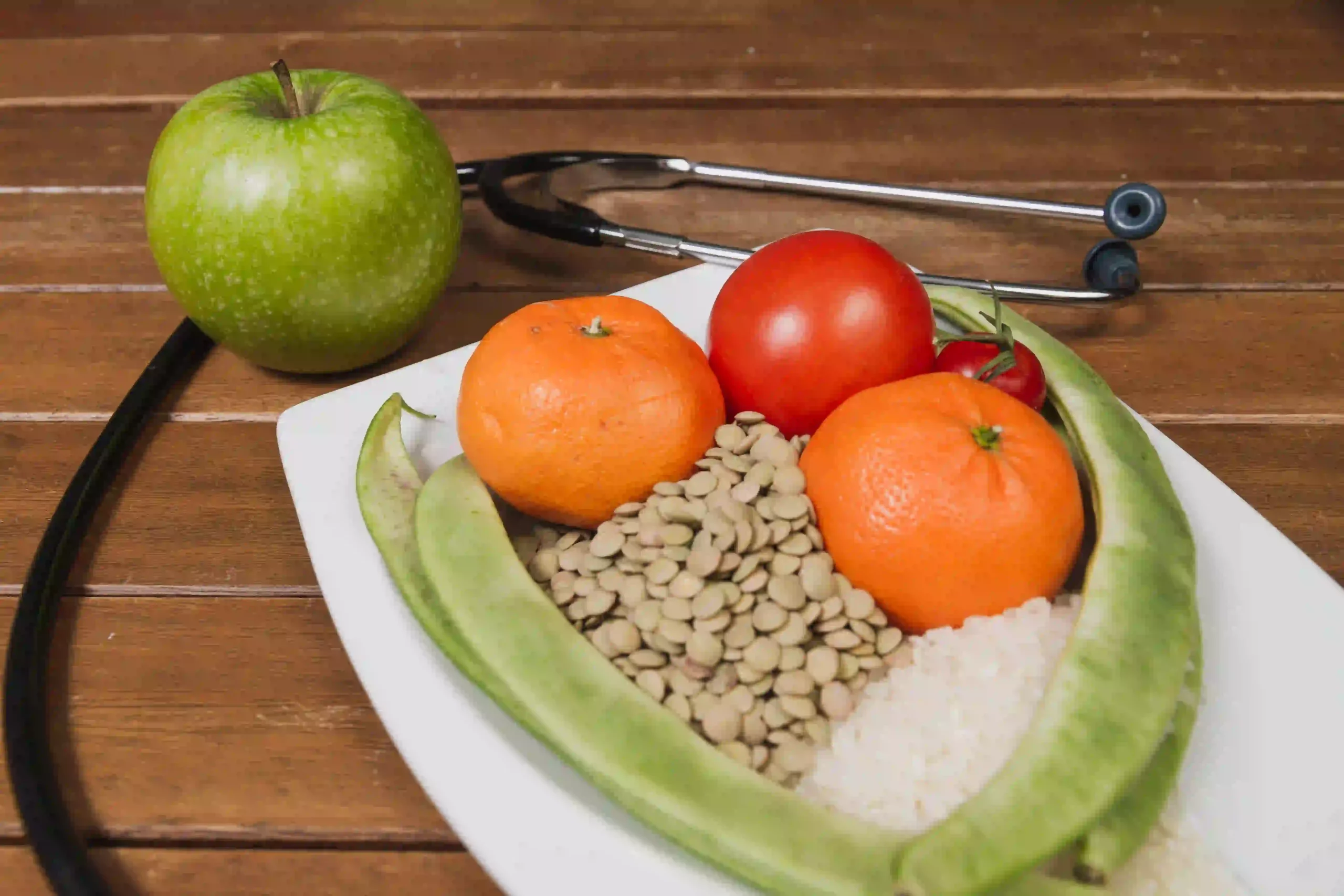
Your body makes uric acid every day, but too much of it can cause trouble. Most people don’t know they have high uric acid levels, also known as hyperuricemia, until it quietly builds up in the system and leads to painful conditions like gout, kidney stones, or long-term joint damage.
If you’re wondering how to reduce high uric acid, the good news is that it’s possible to lower it naturally through diet and lifestyle changes.
Uric acid is a natural waste product that forms when your body breaks down purines, compounds found in certain foods and drinks. While your kidneys usually filter out uric acid, high levels can accumulate in your blood if your body produces too much or fails to eliminate it efficiently.
Here are 10 scientifically backed tips to reduce high uric acid naturally and effectively:
Dietary Changes

If you’re looking for how to reduce high uric acid naturally, start with your plate. Diet plays a crucial role in managing uric acid levels. Choosing the right foods to reduce high uric acid and avoiding purine-rich or sugary items can make a significant difference. Here’s how to get started:
1. Limit Purine-Rich Foods
Purines are compounds found naturally in some foods. When the body breaks them down, it produces uric acid. Foods like red meat, organ meats, shellfish, and oily fish are high in purines and can spike uric acid levels. Choose low-purine alternatives like eggs, dairy, and plant-based proteins.
2. Cut Back on Sugar and Sweetened Drinks
Fructose in sugary drinks and processed foods produces uric acid levels when metabolized[1]. Swap sugary sodas for water, and satisfy your sweet tooth with fruits like berries, which have a lower fructose content.
3. Add More Vitamin C
Vitamin C helps reduce high uric acid by improving kidney excretion. Add citrus fruits like oranges and lemons, strawberries, bell peppers, and broccoli to your meals. You can also consider vitamin C supplements, but only after consulting your doctor.
Try vitamin C supplements to help lower uric acid levels.
4. Cleanse Naturally with High-Fiber Foods
Fiber supports healthy blood sugar levels and helps your body flush out excess uric acid. Fiber can help block some of the purines from getting absorbed into your body. Since purines turn into uric acid, this may help keep your uric acid levels lower. Include more oats, fruits, vegetables, legumes, and whole grains in your daily meals to get the benefits.
5. Eat Cherries or Drink Cherry Juice
Cherries—especially tart ones—are rich in antioxidants called anthocyanins, which help fight inflammation and support healthy uric acid levels. Regular consumption may lower the risk of gout attacks by reducing both swelling and uric acid buildup. Enjoy them fresh or as unsweetened tart cherry juice.
Lifestyle Changes

Lifestyle changes play a key role in how to reduce high uric acid naturally and maintaining healthy levels. Along with the right foods to reduce high uric acid, habits like hydration, exercise, and weight management can help reduce high uric acid in the body without medicine.
6. Stay Hydrated
Staying hydrated is key when you’re figuring out how to reduce high uric acid in the body. Drinking 8–10 glasses of water daily helps your kidneys flush out uric acid more efficiently, which can help reduce high uric acid naturally and lower the risk of conditions like gout or kidney stones.
7. Maintain a Healthy Weight
Extra body fat can increase uric acid production and slow down its elimination. Being overweight is closely linked to high uric acid levels[2]. Losing excess weight can significantly help reduce high uric acid in the body and lower your risk of related health issues. A combination of balanced meals and regular exercise can help manage weight and uric acid levels.
8. Limit Alcohol
Alcohol, especially beer, is high in purines and can sharply increase uric acid levels. Even hard liquor and wine may contribute, though less than beer. Cutting back or avoiding alcohol is key to managing gout and reducing uric acid naturally.
9. Manage Blood Sugar Levels
Poorly controlled blood sugar can interfere with how your body processes and eliminates uric acid. Insulin resistance, common in diabetes and prediabetes, reduces the kidneys’ ability to excrete uric acid effectively. Hyperuricemia is significantly associated with insulin resistance and increased risk of type 2 diabetes[3]. To reduce high uric acid naturally, focus on whole, low glycemic index foods like legumes, leafy greens, and whole grains, and monitor your blood sugar regularly.
10. Watch Your Medications
Certain medications can increase uric acid in the body. Diuretics (often used for high blood pressure), low-dose aspirin, and drugs like cyclosporine may impair uric acid excretion. If you have persistent hyperuricemia or gout, speak with your doctor to explore safer alternatives or adjust your treatment plan. Always consult before stopping any prescribed medicine.
Conclusion
Managing high uric acid doesn’t always require medication—simple diet and lifestyle changes can make a big difference. By choosing the right foods to reduce high uric acid, staying hydrated, maintaining a healthy weight, and monitoring your blood sugar, you can effectively support your body’s ability to flush out excess uric acid. These tips on how to reduce high uric acid naturally are backed by science and easy to adopt. If levels remain high or symptoms worsen, consult your doctor to explore further options, including medicine to reduce high uric acid when needed.
FAQs
Q1: What is the fastest way to reduce high uric acid in the body?
The fastest way to reduce high uric acid in the body is by staying well-hydrated, avoiding purine-rich foods, and using medicine to reduce high uric acid if prescribed. For long-term control, combine lifestyle changes with dietary adjustments.
Q2: What are the best foods to reduce high uric acid naturally?
The best foods to reduce high uric acid include high-fiber options like oats and vegetables, vitamin C-rich fruits such as oranges and berries, and low-fat dairy. Cherries and whole grains also help reduce high uric acid naturally.
Q3: How can I reduce high uric acid without medication?
You can reduce high uric acid naturally by limiting red meat and sugary drinks, avoiding alcohol, drinking 8–10 glasses of water daily, and maintaining a healthy weight. These lifestyle changes can support uric acid balance effectively.
Q4: Are there medicines to reduce high uric acid if lifestyle changes don’t help?
Yes, if natural methods don’t work, your doctor may prescribe medicine to reduce high uric acid. Always consult a healthcare provider before starting medication.
Q5: How do I know if I have high uric acid levels?
A simple blood test can measure uric acid levels. Symptoms of high uric acid may include joint pain, especially in the big toe, which could indicate gout. Early diagnosis helps in better uric acid reduction.
Q6: Can I completely cure high uric acid levels?
While there’s no one-time “cure,” it’s possible to manage and reduce high uric acid in the body effectively through consistent diet, hydration, and healthy habits. Long-term control prevents complications like gout and kidney stones.
Q7: What is considered a high uric acid level?
A standard uric acid level is under 6.8 mg/dL. Levels above 6.8 mg/dL are considered hyperuricemia, which can lead to gout, kidney stones, and acidic blood or urine.
(The article is written by Dr.Subita Alagh, Senior Executive, and reviewed by Monalisa Deka, Senior Health Content Editor)
Recommended Reads
High Uric Acid? Say Hello to Summer Fruits
High Uric Acid Relief: Top Drinks & Sips to Avoid
References
- Russo E, Leoncini G, Esposito P, et al. Fructose and Uric Acid: Major Mediators of Cardiovascular Disease Risk Starting at Pediatric Age. Int J Mol Sci. 2020;21(12):4479. Published 2020 Jun 24. doi:10.3390/ijms21124479 Available online: gov/articles/PMC7352635/
- Zhou J, Wang Y, Lian F, et al. Physical exercises and weight loss in obese patients help to improve uric acid. Oncotarget. 2017;8(55):94893-94899. Published 2017 Oct 25. doi:10.18632/oncotarget.22046. Available online: https://pmc.ncbi.nlm.nih.gov/articles/PMC5706921/
- Ma L, Wang J, Ma L, Wang XM. The link between hyperuricemia and diabetes: insights from a quantitative analysis of scientific literature. Front Endocrinol (Lausanne). 2025;15:1441503. Published 2025 Feb 7. doi:10.3389/fendo.2024.1441503. Available online: https://pmc.ncbi.nlm.nih.gov/articles/PMC11842261/